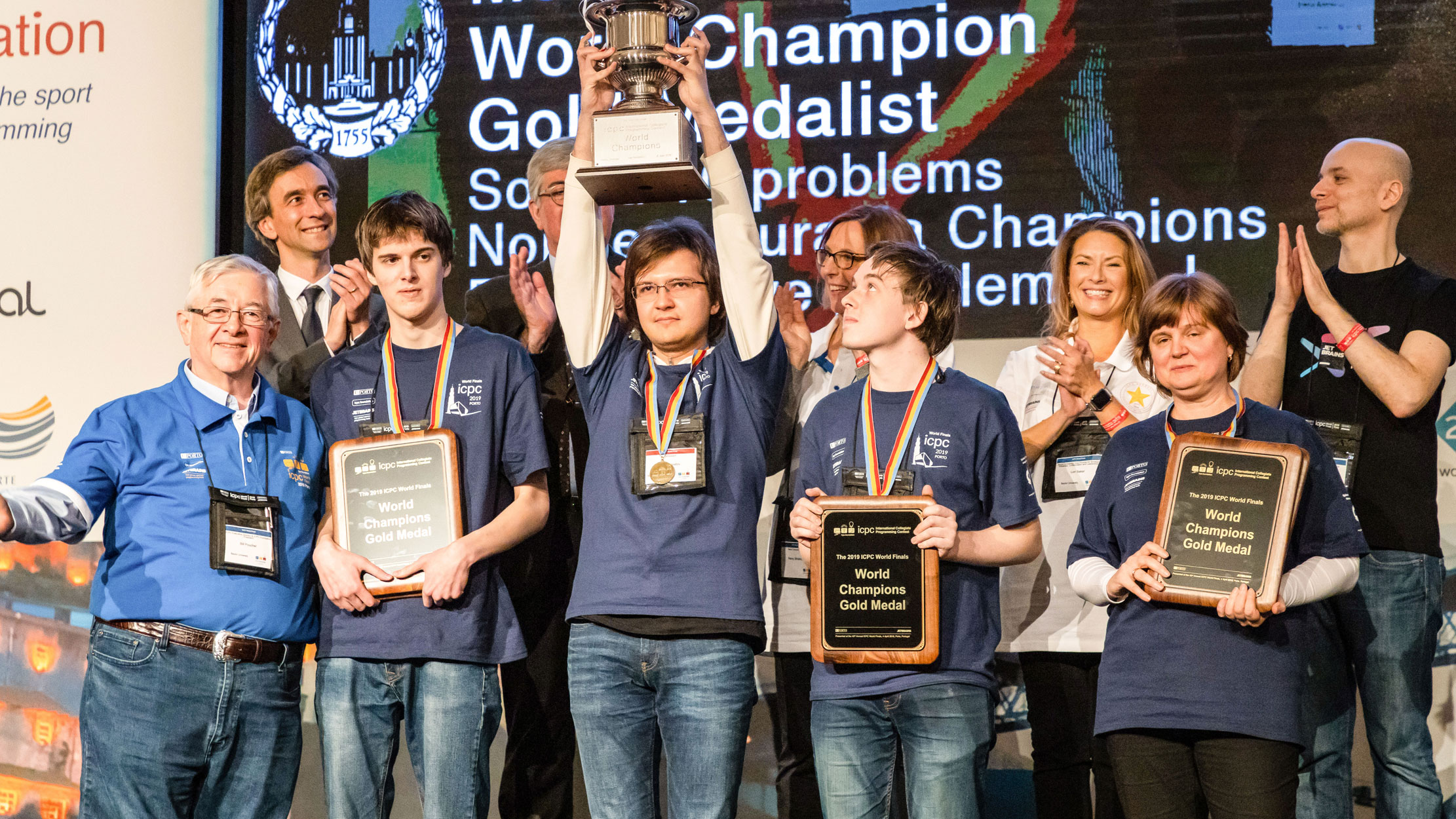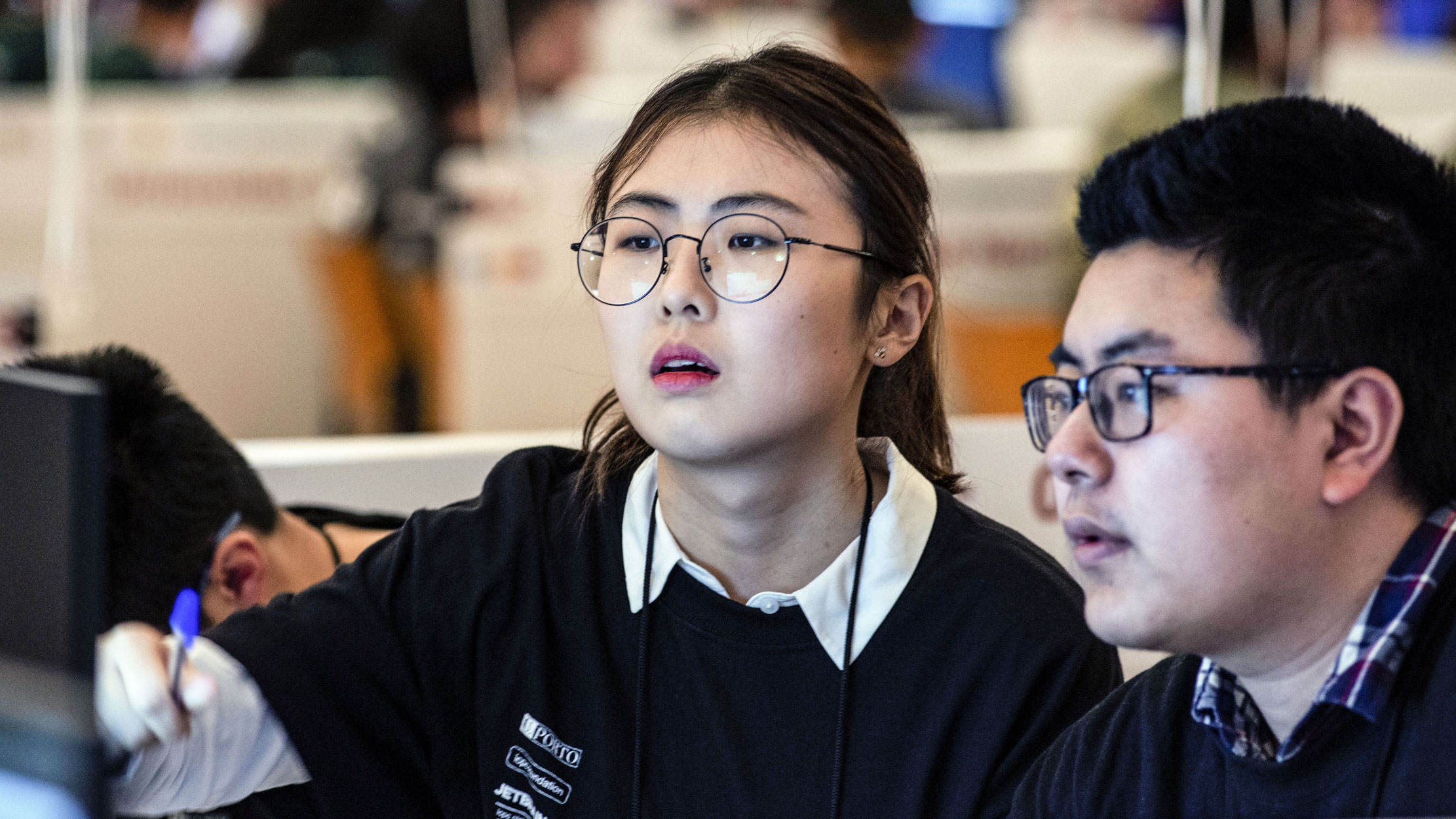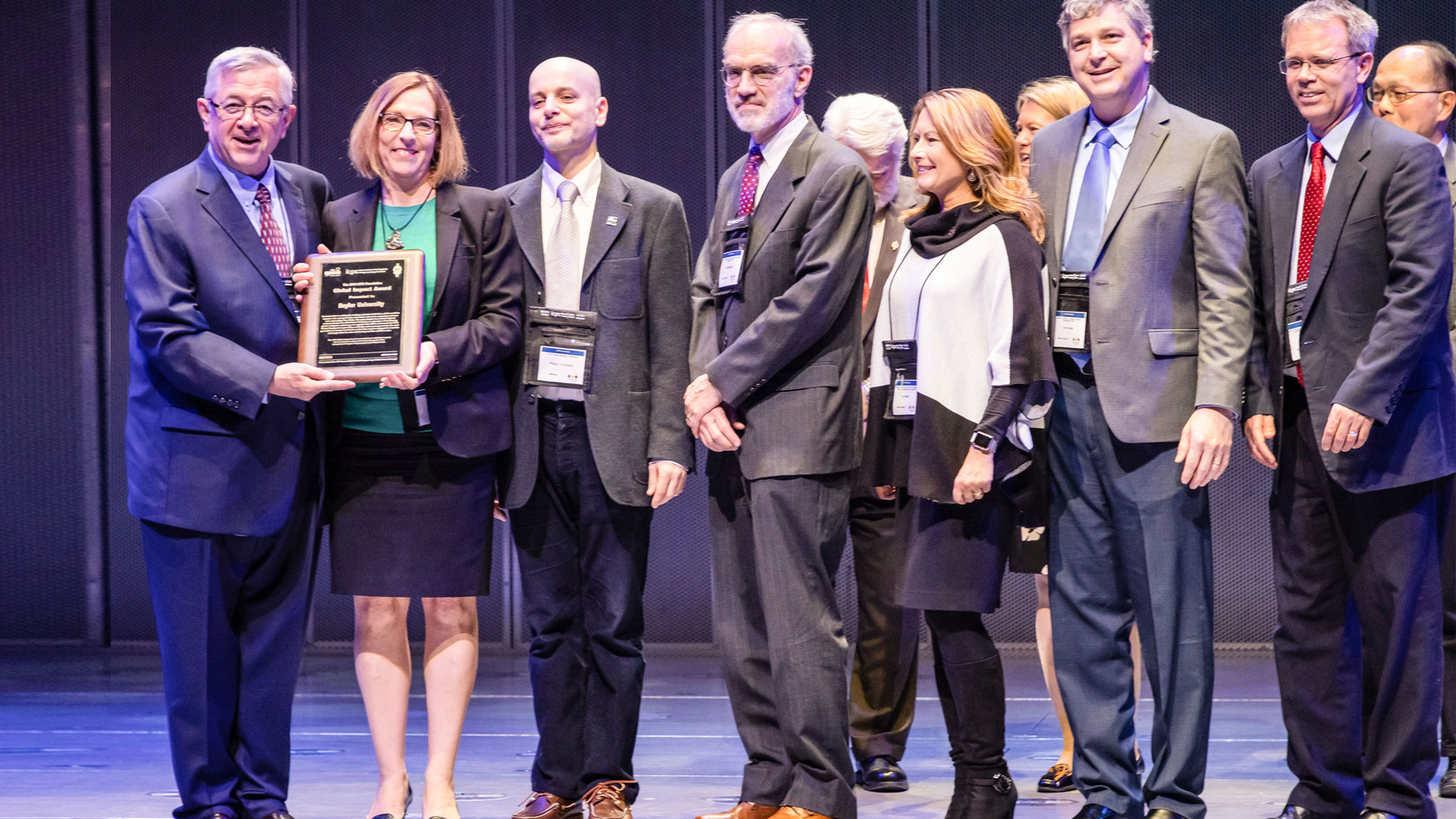Leading the Competition
Raising the bar of excellence for the next generation of problem solvers
Spanning more than four decades, college students from around the globe have competed to solve real-world problems such as genetic mapping and city planning armed only with algorithms, codes and each other.
The International Collegiate Programming Contest (ICPC) — often called the “battle of the brains” — hosts local, regional and international competitions annually, and Baylor University is the organization’s hub.
In April, Baylor was honored with the Global Impact Award during this year’s 43rd Annual ICPC World Finals in Porto, Portugal. The University was recognized for 35 years of commitment to the contest’s organizational body, the ICPC Foundation, which has called Baylor home since the 1980s. Dr. Nancy Brickhouse, BA ’82, University Provost, accepted the award on Baylor’s behalf.
“Our involvement with ICPC has enabled our faculty and students to stay at the cutting edge of changes in both computer science and computer science education,” Brickhouse says. “ICPC has enabled us to build relationships with colleagues from across the globe as together we cultivate the students and the skills in our students that will enable them to take on some of the most challenging problems in the world.”
ICPC is the oldest, largest and most prestigious programming contest in the world, and it continues to grow and attract students and teachers. For the 2019 competition, 52,709 contestants from 3,233 universities in 110 countries on six continents vied for a spot in the World Finals. Teams comprised of three students each represented colleges and universities from countries such as Egypt, Lebanon, China, Taiwan, Costa Rica, Belarus and England.
Dr. William Poucher, a Baylor computer science professor, is the ICPC Foundation’s executive director.
“These students are athletes,” Poucher says. “They perform in a sport — competitive programming — that demands absolute mastery of algorithms, which allows them to invent solutions that work.”
“These students are athletes,” Poucher says. “They perform in a sport — competitive programming — that demands absolute mastery of algorithms, which allows them to invent solutions that work.”
The problems for the most recent competition included several simple scenarios, such as finding the optimal order in which to display tiles in a storefront window and devising a list of moves for a game of checkers. However, also included were more difficult tasks, like determining circular DNA for a bioinformatics research group, deciding where to place road signs for a city, and redirecting rainfall for a popular tourist vineyard.
“What I truly love about the ICPC is that we’re a culture of excellence that is principle-based and service-based,” Poucher says. “First, we do what we do in good will. Second, whatever we do, we follow the golden rule. There are not a whole lot of organizations that will buy into that. However, these two principles are the reasons why we’re 50 years old.”
The Baylor contingent, including Professor Bill Poucher (far left) and Provost Nancy Brickhouse (second from left), receive the University’s Global Impact Award at the 43rd Annual ICPC World Finals in Porto, Portugal.
Leadership provided by faculty from Baylor’s computer science department is a major contribution to the contest’s success and longevity. Poucher took over the Foundation’s leadership in the 1980s and continues to serve as its executive director today. Dr. Jeff Donahoo, BA ’91, MS ’93, also a Baylor computer science professor, serves as the deputy executive director of the Foundation and the executive director for the World Finals.
In their roles, Poucher and Donahoo were — and continue to be — instrumental in developing a network of students, colleagues and professionals who are committed to solving problems and cultivating servant leaders, ethics and good will to all.
“The ICPC is important to Baylor because it positions the University’s name as a leader in education,” Donahoo says. “There are lots of places around the world that have heard the name Baylor through ICPC, and it really projects the strength of Baylor’s commitment to global education.”
GLOBAL EDUCATION
There is a demand for well-trained and highly educated computer programmers due to the increased use of technology in the average household and in business. Baylor remains competitive and innovative and enjoys the benefit of its association with ICPC. It also allows Baylor’s students and faculty to shine the University’s light to the world.
Dr. Lori Baker, BA ’93, MA ’94, Baylor’s vice provost for faculty development and diversity, says the University’s association with ICPC provides transformational, global education at its best.
“You can bring people together around computer language, and they all speak the same language. It doesn’t matter if you’re Chinese; it doesn’t matter if you’re Cuban; it doesn’t matter if you’re from Africa; you’re all speaking the same language for programming,” Baker says. “The idea that you can bring so many different cultures together, and they can get to know and appreciate one another, is like doing diversity and inclusion at its finest.”
Students and educators from around the world have heard Baylor’s name because of ICPC. Dr. Greg Hamerly, Baylor associate professor, has been involved with ICPC since he was a student at the University of California San Diego, where he qualified for the World Finals in 2000 and 2001. His memory of Baylor being the home of ICPC was one of the reasons he chose to apply for a Baylor faculty position.
“ICPC has been a big part of my life for 20 years,” Hamerly says. “I really enjoyed it as a student and now as a coach. It’s a cultural exchange as much as it is an information exchange, and it’s a growing experience for the students and the staff. ICPC is good for Baylor because it shines a light on Baylor, and it’s good for us to get our name out there. It’s a place where we can serve and help.”
SERVICE THROUGH COMPETITION
Competition at every level of ICPC is tough, and the stakes are high at the World Finals. Winning can guarantee team members employment with major companies such as Google, Facebook, Apple and Amazon.
Dr. Erich Baker, chair of Baylor’s computer science department and a bioinformatics professor, calls it competitive learning.
“We’re making intellectual problems competitive in a similar way that soccer or football is,” Baker says. “We’re competitors by nature, so that resonates with me, and these students will get job offers just from being on the winning team. They change their families’ futures by doing this. That’s pretty amazing.”
Team members must work together to solve problems through competition. Their technical skills are critical, but their knowledge of what is right and wrong — their principles — are equally or more important.
“We are not only providing students with technical skills, but we are also providing them opportunities to think about what they should do in a situation,” Brickhouse says. “That’s where Christian ethics should guide the way we make decisions about what we should and shouldn’t do. It’s one of the reasons why President [Linda A.] Livingstone likes to say, ‘the world needs Baylor.’ I think this is a very good example of that. We need computer scientists who are asking those questions as well, who have those skills but also have the wisdom to know what to do and what not to do.”
Now, the newly established ICPC Dr. Orlando Madrigal Scholar award will provide an opportunity for select World Finals participants — either competitors, coaches or tool developers at that level — to experience Baylor firsthand.
A grant from JetBrains Foundation allowed the ICPC Foundation to create the award to recognize Baylor’s contributions to the competition and to honor Madrigal, a longtime advocate for ICPC and executive director of Upsilon Pi Epsilon (UPE) honor society, which also received a 2019 Global Impact Award. UPE membership, regarded as the highest academic recognition for collegiate computer and information technology students, is granted to ICPC World Finalists.
Donahoo will oversee the Madrigal Scholar award that aims to support high-caliber graduate students at Baylor — accelerating the University’s commitment to doctoral research and development — and to further advance the art and science of competitive programming.
The first Orlando Madrigal Scholar is Suresh Karki, who arrived at Baylor in fall 2018. The current master’s student has developed tools used at all levels of ICPC contests, including the World Finals.
“We are delighted to help propel both the ICPC community and Baylor University research as they seek to raise the bar of excellence for the next generation of problem solvers,” Poucher says. “Through ICPC we’re helping students find out what servant leadership is about and lighting the world with hope.”


